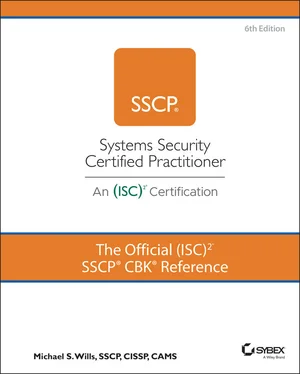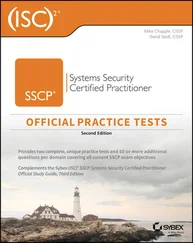Mike Wills - The Official (ISC)2 SSCP CBK Reference
Здесь есть возможность читать онлайн «Mike Wills - The Official (ISC)2 SSCP CBK Reference» — ознакомительный отрывок электронной книги совершенно бесплатно, а после прочтения отрывка купить полную версию. В некоторых случаях можно слушать аудио, скачать через торрент в формате fb2 и присутствует краткое содержание. Жанр: unrecognised, на английском языке. Описание произведения, (предисловие) а так же отзывы посетителей доступны на портале библиотеки ЛибКат.
- Название:The Official (ISC)2 SSCP CBK Reference
- Автор:
- Жанр:
- Год:неизвестен
- ISBN:нет данных
- Рейтинг книги:4 / 5. Голосов: 1
-
Избранное:Добавить в избранное
- Отзывы:
-
Ваша оценка:
- 80
- 1
- 2
- 3
- 4
- 5
The Official (ISC)2 SSCP CBK Reference: краткое содержание, описание и аннотация
Предлагаем к чтению аннотацию, описание, краткое содержание или предисловие (зависит от того, что написал сам автор книги «The Official (ISC)2 SSCP CBK Reference»). Если вы не нашли необходимую информацию о книге — напишите в комментариях, мы постараемся отыскать её.
The Official (ISC)2 SSCP CBK Reference
SSCP Study Guide
The Official (ISC)2 SSCP CBK Reference
The Official (ISC)2 SSCP CBK Reference — читать онлайн ознакомительный отрывок
Ниже представлен текст книги, разбитый по страницам. Система сохранения места последней прочитанной страницы, позволяет с удобством читать онлайн бесплатно книгу «The Official (ISC)2 SSCP CBK Reference», без необходимости каждый раз заново искать на чём Вы остановились. Поставьте закладку, и сможете в любой момент перейти на страницу, на которой закончили чтение.
Интервал:
Закладка:
Chapter membership earns you CPE credits and can make you eligible for special discounts on (ISC) 2products and programs.
LET'S GET STARTED!
This book is for you. This is your journey map, your road atlas, and your handbook. Make it work for you.
Choose your own course through it, based on what you need on the job today and every day.
Go for it.
HOW TO CONTACT THE PUBLISHER
If you believe you've found a mistake in this book, please bring it to our attention. At John Wiley & Sons, we understand how important it is to provide our customers with accurate content, but even with our best efforts an error may occur.
In order to submit your possible errata, please email it to our Customer Service Team at wileysupport@wiley.comwith the subject line “Possible Book Errata Submission”.
NOTES
1 1I had the privilege of developing and teaching some of these evolving concepts at the U.S. National Defense University's School of Information Warfare and Strategy, 1998-2000. At the School, we made extensive use of the “Strategic Information Warfare” series of publications by Roger C. Molander and others at the RAND Corporation, which were exploring this backward chain from desired strategic effect to the “kill effect” required of attacks on information and information systems.
2 2Ponemon Institute LLC, for IBM Security. “2021 Cost of a Data Breach Study: Global Overview.” Other sources, particularly business news media in India and Asia, have claimed as high as 220 days for this average, but there is little hard data to support this larger claim. Either way, this is seriously bad news.
CHAPTER 1 SSCP ®Security Operations and Administration
THIS IS WHERE THEplanning hits reality; it's in the day to day of information security operations that you see every decision made during the threat assessments and the risk mitigation plans being live-fire tested by your co-workers, customers, legitimate visitors, and threat actors alike. Whether you're an on-shift watch-stander in a security operations center (SOC) or network operations center (NOC) or you work a pattern of normal business hours and days, you'll be exposed to the details of information security in action.
Security operations and administration entail a wide breadth of tasks and functions, and the security professional is expected to have a working familiarity with each of them. This can include maintaining a secure environment for business functions and the physical security of a campus and, specifically, the data center. Throughout your career, you will likely have to oversee and participate in incident response activities, which will include conducting investigations, handling material that may be used as evidence in criminal prosecution and/or civil suits, and performing forensic analysis. The Systems Security Certified Practitioner (SSCP) should also be familiar with common tools for mitigating, detecting, and responding to threats and attacks; this includes knowledge of the importance and use of event logging as a means to enhance security efforts. Another facet the security practitioner may have to manage could be how the organization deals with emergencies, including disaster recovery.
There is a common thread running through all aspects of this topic: supporting business functions by incorporating security policy and practices with normal daily activities. This involves maintaining an accurate and detailed asset inventory, tracking the security posture and readiness of information technology (IT) assets through the use of configuration/change management, and ensuring personnel are trained and given adequate support for their own safety and security.
This chapter will address all these aspects of security operations. The practitioner is advised, however, to not see this as a thorough treatment of all these concepts, each of which could be (and has been) the subject of an entire book (or books) by themselves; for each topic that is unfamiliar, you should look at the following content as an introduction only and pursue a more detailed review of related subject matter.
NOTEThe countries and regions that an organization operates in may have varying, distinct, and at times conflicting legal systems. Beyond considerations of written laws and regulations, the active functioning of court systems and regulatory bodies often has intricate, myriad applications in the real world that extend far beyond how things are codified in written laws. These factors become even more varied and complex when an organization functions in multiple countries and needs to deal with actual scenarios that directly involve international law and the laws of each respective nation. With that in mind, it is always imperative to get the input of a professional legal team to fully understand the legal scope and ramifications of security operations (and basically all operations and responsibilities beyond security as well).
COMPLY WITH CODES OF ETHICS
Your day-to-day journey along the roadmap of security operations and administration must keep one central ideal clearly in focus. Every day that you serve as an information security professional, you make or influence decisions. Every one of those decision moments is an opportunity or a vulnerability; it is a moment in which you can choose to do the technically and ethically correct thing or the expedient thing. Each of those decision moments is a test for you.
Those decisions must be ethically sound; yes, they must be technically correct, cost-effective, and compliant with legal and regulatory requirements, but at their heart they must be ethical . Failure to do so puts your professional and personal integrity at risk, as much as it puts your employer's or your clients' reputation and integrity at risk.
Being a security professional requires you to work, act, and think in ways that comply with and support the codes of ethics that are fundamental parts of your workplace, your profession, and your society and culture at large. Those codes of ethics should harmonize with if not be the fundamental ethical values and principles you live your life by—if they do not, that internal conflict in values may make it difficult if not impossible to achieve a sense of personal and professional integrity! Professional and personal integrity should be wonderfully, mutually self-reinforcing.
Let's first focus on what ethical decision-making means. This provides a context for how you, as an SSCP, comply with and support the (ISC) 2Code of Ethics in your daily work and life. We'll see that this is critical to being able to live up to and fulfill the “three dues” of your responsibilities: due care, due diligence, and due process.
Understand, Adhere to, and Promote Professional Ethics
Let's start with what it means to be a professional: It means that society has placed great trust and confidence in you, because you have been willing to take on the responsibility to get things done right. Society trusts in you to know your practice, know its practical limits, and work to make sure that the services you perform meet or exceed the best practices of the profession. This is a legal and an ethical responsibility.
Everything you do requires you to understand the needs of your employers or clients. You listen, observe, gather data, and ask questions; you think about what you've learned, and you come to conclusions. You make recommendations, offer advice, or take action within the scope of your job and responsibilities. Sometimes you take action outside of that scope, going above and beyond the call of those duties. You do this because you are a professional. You would not even think of making those conclusions or taking those actions if they violently conflicted with what known technical standards or recognized best technical practice said was required. You would not knowingly recommend or act to violate the law. Your professional ethics are no different. They are a set of standards that are both constraints and freedoms that you use to inform, shape, and then test your conclusions and decisions with before you act.
Читать дальшеИнтервал:
Закладка:
Похожие книги на «The Official (ISC)2 SSCP CBK Reference»
Представляем Вашему вниманию похожие книги на «The Official (ISC)2 SSCP CBK Reference» списком для выбора. Мы отобрали схожую по названию и смыслу литературу в надежде предоставить читателям больше вариантов отыскать новые, интересные, ещё непрочитанные произведения.
Обсуждение, отзывы о книге «The Official (ISC)2 SSCP CBK Reference» и просто собственные мнения читателей. Оставьте ваши комментарии, напишите, что Вы думаете о произведении, его смысле или главных героях. Укажите что конкретно понравилось, а что нет, и почему Вы так считаете.












